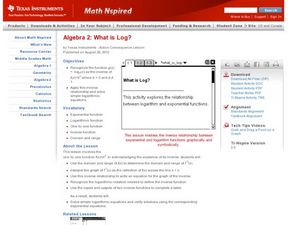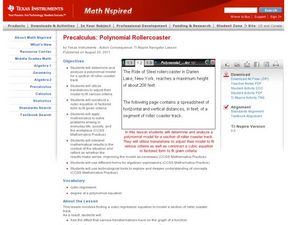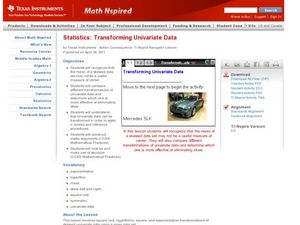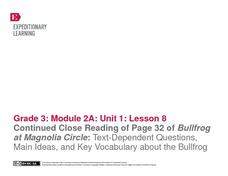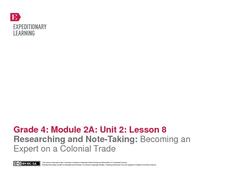Curated OER
What is Log?
Young mathematicians differentiate between logs and natural logs in this algebra lesson. They solve functions and logarithmic functions. Learners also graph and rewrite the exponential and log functions.
Curated OER
Polynomial Rollercoaster
Learners relate polynomials to a rollercoaster track as they translate a graph around on a coordinate plane. They differentiate between different forms of algebraic expressions.
Curated OER
Transforming Univariate Data
Learners analyze plotted data in this statistics lesson. They differentiate between skewed and normal data. They also explore and interconnect exponential growth and decay as it relates to the data.
Curated OER
Napolean Triangle
Learners investigate the Napoleon triangle theory. In this polygon lesson plan, students differentiate between the boundary points, interior and lattice point of a polygon. They apply concepts of equilateral triangles to solve...
Pennsylvania Department of Education
Exploring Key Ideas and Details in Fiction and Nonfiction
Third graders participate in activities to differentiate fiction from nonfiction. In this fiction lesson, 3rd graders describe the elements of a fiction story. Students compare and contrast fiction and non fiction elements....
Curated OER
Letter Sound Blending
Students play a game that asks them to blend sounds and differentiate between long and short vowels. They give clues to one student by sounding out all consonants and classifying the vowel as short or long. The student then blends the...
Curated OER
Troubling Tenses-- Past Simple Vs. Present Continuous 2
In this language arts worksheet, students learn to differentiate between "yesterday" and "tomorrow" by filling in the blanks in 15 sentences with the correct word.
Curated OER
The Differences Between Turtles and Tortoises
First graders differentiate between turtles and tortoises. In this turtles and tortoises lesson students are visited by a turtle and a tortoise. Students write a letter with an illustration after the animals visit the class.
Curated OER
The Real Number System
Learners analyze the real number system. They discuss real numbers, rational and irrational numbers, integers, whole numbers, natural numbers and more of the real number in the system. They differentiate between all these numbers.
Curated OER
Half Lives
Students investigate the concept of half-life by conducting an M&M experiment. In this chemistry lesson, students differentiate nuclear fusion and fission. They present investigation findings to class.
Curated OER
Adding to the Picture: The 1963 March on Washington
Who do your scholars imagine when they think about the civil rights movement? If only a few faces come to mind, this lesson will expand their concepts of the movement's leaders. Learners examine an image of the 1963 March on Washington,...
Curated OER
Formula Sheet for Commas and Punctuation of Clauses
This handout illustrates the structure and appropriate punctuation for sentences that include independent and dependent clauses. It differentiates between coordinate and subordinate clauses. No exercises or questions are provided and the...
Smithsonian Institution
Women's Role in the War Effort
Did you know that many women were Confederate spies during the Civil War? The resource focuses particularly on the important role women played for both the Union and Confederacy. It uses exercises such as a discussion, video, analyzing...
Math by Design
Transformations – Reflections
Scholars use interactive resources to figure out how to mathematically draw a reflection of a geometric shape viewed in a mirror. To conclude the activity, class members are asked to deduce the result of multiple reflections across...
Smithsonian Institution
Lexington and Concord: Historical Interpretation
Learners view and analyze three different images related to the Battle of Lexington and Concord. They also answer a variety of questions in a graphic organizer to help keep the information straight.
Creative Competitions, Inc.
Odyssey of the Mind Curriculum Activity: Fantastic Fairy Tale
Learning about literature can be so much fun; it can also be made more accessible through projects and dramatic play. As they explore theme, character, and setting, the class gets creative and makes a dramatic recreation of a classic...
EngageNY
Close Reading of Bullfrog at Magnolia Circle: Text-Dependent Questions, Main Ideas, and Key Vocabulary about the Bullfrog
As your 3rd grade class finishes reading Bullfrog at Magnolia Circle, the eighth lesson plan of this unit helps readers from an understanding of the very specific information on the final page of the book. As with the entire unit,...
EngageNY
Continued Close Reading of Bullfrog at Magnolia Circle: Text-Dependent Questions and Vivid Words and Phrases
In the third activity from this unit based on the book Bullfrog at Magnolia Circle, learners focus on using specific details from the text-to-answer questions about the habitat of bullfrogs. While reading the text, young...
EngageNY
Listening Closely and Taking Notes in Expert Groups: Colonial Trade Podcast
The twelfth instructional activity of this unit builds on the skills developed in the previous instructional activity, as fourth graders continue their quest to become experts on colonial trade by listening to interviews with historical...
EngageNY
Listening Closely and Taking Notes: Colonial Trade Podcast About the Wheelwright
Voices from the past. Young scholars listen to a podcast interview with a historical re-enactor as they continue their research in the eleventh instructional activity of this unit on colonial trade. Applying their close reading skills,...
EngageNY
Researching and Note-Taking: Becoming an Expert on a Colonial Trade
Fourth graders work in small groups to become experts on different colonial trades in the eighth instructional activity of this unit. Working toward the long-term goal of writing a piece of historical fiction, young scholars read...
EngageNY
Reading and Taking Notes on Colonial Trades
In the tenth instructional activity of this unit, young scholars learn to categorize information as they continue researching their colonial trade. During guided practice, the teacher models how to read informational text slowly while...
EngageNY
Science Talk: How do Bullfrogs Survive
Following the reading of the book Bullfrog at Magnolia Circle, the ninth lesson in this unit involves emerging experts in a science talk about how bullfrogs survive. Looking back through the text, young scholars prepare for the...
EngageNY
Mid-Unit 2 Assessment: Inferring About the Silversmith Trade in Colonial Times
The seventh lesson plan in this unit on colonial trade assesses fourth graders' ability to use details from an informational text to make inferences and create a piece of informative writing. The included assessment begins with learners...
Other popular searches
- Cellular Differentiation
- Cell Differentiation
- Implicit Differentiation
- Genetic Differentiation
- Differentiation and Math
- Anti Differentiation
- Differentiation Strategies
- Differentiation Rule
- Differentiation Lesson Plans
- Logarithmic Differentiation
- Differentiation Component
- Writing Differentiation
